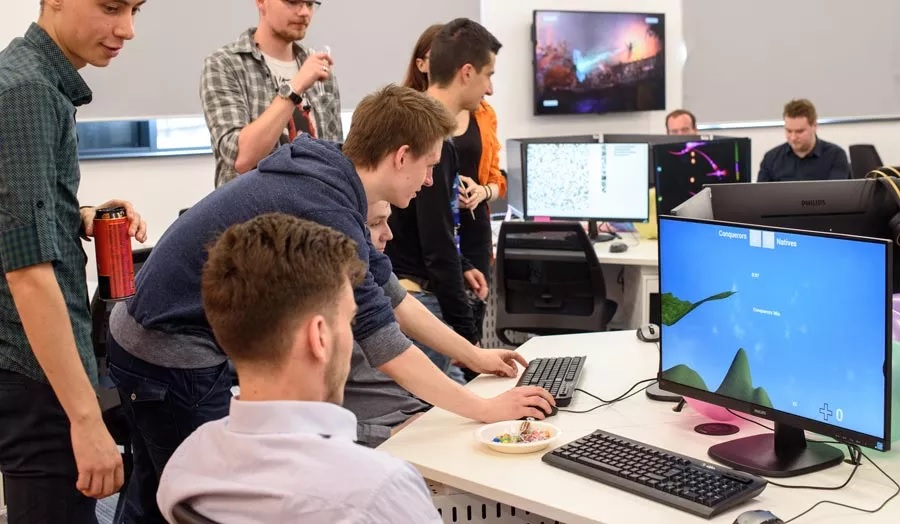Apply for this course
Please select when you would like to start:
If you're a UK applicant wanting to study full-time starting in September, you must apply via UCAS unless otherwise specified. If you're an international applicant wanting to study full-time, you can choose to apply via UCAS or directly to the University.
If you're applying for part-time study, you should apply directly to the University. If you require a Student visa, please be aware that you will not be able to study as a part-time student at undergraduate level.
Why study this course?
Our Computer Systems Engineering and Robotics (including foundation year) BEng is a four-year degree that includes a built-in foundation year (Year 0).
The foundation year will introduce you to the key principles of computer systems and engineering, preparing you for the next three years of your course. You’ll graduate with all the applied knowledge you’ll need to work in the computing and engineering industries.
First in the UK for student satisfaction
Our electrical and electronic engineering courses are ranked first in the UK for student satisfaction in the Complete University Guide 2025
Benefit from specialist facilities
Gain access to our specialist laboratories for computer-aided design (CAD), electronics, microwave and satellite communications, embedded systems and digital systems and optoelectronics
Learn the skills you need to reach your full potential
This four-year degree course includes an intensive foundation year (Year 0), which will provide you with the skills required for your subsequent three years of study
Course modules
The modules listed below are for the academic year 2024/25 and represent the course modules at this time. Modules and module details (including, but not limited to, location and time) are subject to change over time.
Year* 0 modules
Year 1 modules
Year 2 modules
Year 3 modules
Cyber Security Fundamentals
This module currently runs:all year (September start) - Wednesday afternoon
(core, 30 credits)
On this module students will learn the fundamental knowledge concerning computer security, basic cyber threats and the corresponding detection and defence techniques. Core security concepts, terminology, technologies and professional cyber security skills will be introduced via case studies and laboratory experiments.
Read full detailsIntroduction to Robotics and Internet of Things
This module currently runs:all year (September start) - Wednesday morning
(core, 30 credits)
This module aims to introduce basic hardware and software elements relevant to robotics and internet of things (IoT) at foundation level (level 3). In particular, the module is designed to provide students with an introductory overview and practical experience in design and development of a simple system involving elements of robotics and IoT.
The module covers the necessary principles and theory through formal lectures/seminars followed by comprehensive laboratory practice involving workshop-based exercises and a case study.
Read full detailsMathematics
This module currently runs:all year (September start) - Monday morning
(core, 30 credits)
This module introduces students to a range of mathematical techniques involving algebraic properties and graphs of the algebraic, logarithm, exponential and trigonometric functions. Furthermore, the module introduces mathematical techniques of differentiation and integration of simple functions.
Read full detailsProgramming
This module currently runs:all year (September start) - Monday afternoon
(core, 30 credits)
The module introduces students to theoretical concepts underpinning computer software design; and to programming using a high-level language concentrating on sequence, selection, iteration (loops) and list processing. It is assessed by three individual online tests (weighing of 30%, 30%, and 40%).
It aims to enable the student to use a programming language in a familiar and confident way in a variety of practical situations, and to use an integrated programming development environment competently.
It also enables the student to design and write simple programs during workshop time, using the programming language constructs described in the syllabus below.
Read full detailsComputer Hardware and Software Architectures
This module currently runs:all year (September start) - Monday afternoon
(core, 30 credits)
The module introduces students to the basics of Information Technology; past, current and future trend in computer systems. The detailed design of a small-scale Computer Systems is presented where students have the opportunity to build, configure and test a computer system for a given application. Students will identify the basic features of the Windows operating system and its elements. Health Safety issues and the safe disposal of equipment is also covered leading to an understanding and appreciation of social, ethical, environmental and economic issues related to computer’s hardware and software element. The module aims to
1. Introduce students to the fundamental concepts of Information Technology and basic networking,
2. Provide a working technical knowledge of modern computer systems and their respective components,
3. Introduce Operating systems by focusing on Windows products, identifying similarities and differences,
4. Identify the correct approach to preventive maintenance and upgrading and troubleshooting
5. Introducing students to Assembly language and how it interacts with hardware
6. Awareness of social, environmental, commercial and economic aspects of PC technology
Electronics Systems
This module currently runs:all year (September start) - Friday afternoon
(core, 30 credits)
The module is designed to introduce the most common electronics devices and their applications in small-scale systems. The module is divided into two broad sections of analogue and digital electronics. The module is based on formal seminar/lecture sessions followed by comprehensive practical/tutorial sessions in both areas which provide an opportunity for students to gain experience in using and applying the laboratory’s test and measurement equipment/simulators.
The aims of the module are as follows:
1. To familiarise students with commonly used electronic components, standard laboratory test and measurement equipment and their usage in designing/analysing, building, and testing simple electronic circuits/systems.
2. To introduce students to circuit simulation software and develop an awareness of its strengths and limitations
3. To introduce students to the electronics and measurement techniques through practical approach and provide scope for putting theory into practice and develop investigation/analysis skills that exemplify core electrical and measuring principles relevant to the course.
4. To develop the ability to write a well-structured, concise and thoughtful logbook / report / poster.
5. To develop the ability to work independently as well as in team
Read full detailsLogic and Mathematical Techniques
This module currently runs:all year (September start) - Thursday morning
(core, 30 credits)
This module develops a range of mathematical techniques including set theory, logic, relations and functions, algebra, differentiation and integration. The techniques provide the foundation for further study of mathematics and related applications in Computer Science, Computer Games Programming, Computer Systems Engineering and Robotics and Electronics and Internet of Things.
Read full detailsProgramming
This module currently runs:all year (September start) - Tuesday morning
all year (September start) - Tuesday afternoon
(core, 30 credits)
This is an introductory programming module, designed to develop interest, ability and confidence in using a programming language. Students will gain the basic knowledge and experience to solve simple programming problems using established techniques in program design, development and documentation. It is expected that on completion of this module, students will be able to design, implement and test object-oriented programs. The module also enables to self-study a popular programming language and obtain a completion certificate. The student is also expected to develop their confidence needed to program solutions to problems through a series of practical programming exercises.
Assessment: Multiple choice test (30%) + Programming certificate(10%) +Coursework (60%) [Pass on aggregate]
Read full detailsAdvanced Electronics Systems
This module currently runs:spring semester - Thursday afternoon
(core, 15 credits)
This module builds on the knowledge gained in the first-year module CT4002: Electronic Systems. It aims to introduce some subtle, real-world issues associated with electronic sub-systems by means of carefully chosen group design case study. The group design involves hands-on approach in analysis, design and troubleshooting of mixed-signal systems involving discrete components and ICs (Integrated Circuits).
The module follows a key set of engineering processes such as research skills, systems level analysis and design, circuit simulation, PCB/prototyping, soldering and testing which enable them to understand the real-world aspects of simple but sufficiently involved electronic systems. This laboratory-based module is delivered in such a way that students have a balanced autonomy enabling them to explore personalised learning, creative problem solving, demonstrate and acquire transferable skills.
Read full detailsDatabases
This module currently runs:autumn semester - Wednesday morning
autumn semester - Wednesday afternoon
(core, 15 credits)
Introduces techniques for analysing, designing and implementing database systems. An understanding of data modelling and design concepts is provided and database programming language skills are taught. The practical aspect of developing database systems is emphasised and use is made of a widely-used commercial database system (e.g. Oracle) for this purpose.
The module will enable students to give an introduction to the issues governing the design and implementation of database systems. Theoretical aspects of designing sound database systems, as well as the practical aspects of implementing such systems are presented. This therefore allows students to understand, and put into practice, the techniques available for analysing, designing and developing database systems.
Read full detailsMicroprocessors & Embedded Systems
This module currently runs:all year (September start) - Tuesday morning
(core, 30 credits)
This module introduces students to the concepts of microprocessors and the role that hardware and software play in the functional behaviour of microprocessor systems. Students are then introduced to some of the more common microcontrollers. Interfacing external memories as well as various input/output devices and sensors are also covered. The module enables students to analyse the requirements of a given task, make decisions in selecting an appropriate controller, design and implement prototype hardware/software for a typical embedded systems product. Practical workshops are designed to introduce microprocessor software development, testing and debugging. Workshops provide students with an opportunity to use both ‘C’ and assembly language.
Read full detailsNetwork Operating Systems
This module currently runs:autumn semester - Thursday morning
(core, 15 credits)
This module helps the students to develop the theoretical and practical knowledge of Network Operating Systems, used by the enterprise today. This is achieved by exposing the student to some of the most commonly used network operating systems. The student will reinforce their theoretical knowledge in practical sessions where they will install configure, manage and troubleshoot network operating systems.
The module covers the necessary background through formal lectures/seminars followed by comprehensive hands-on practical workshops.
The aims of this module are:
1. To understand the importance of Network operating systems (NOS)
2. To explain the operation of Network operating systems, and their benefits
3. To describe hardware requirements for the effective operation of NOS
4. To compare some of the most commonly available NOS, and their abilities and limitations
5. To understand the concept of virtualisation and its application in modern server environments
6. To understand server documentation, security and trouble shooting
Work Related Learning
This module currently runs:autumn semester - Wednesday afternoon
spring semester - Wednesday afternoon
(core, 15 credits)
This module consists of a short work placement (or work-related activity) lasting over one semester. This usually translates into 12 to 15 full working days (or the part time equivalent of this) in the framework of 150 hours (15-credit module) considering some time for reflection, research and documentation. The work placement is facilitated by University’s Work Based Team (WBT) and Careers and Employability Team. The module enables students to undertake an appropriate short period of professional activity, usually related to their course at level 5 (Intermediate level), with a business or community organization and to gain credit for their achievements. The activity can be a student’s part-time job, a volunteering activity, employment activity, an activity within London Met, an activity related to client’s brief or business start-up activity.
The module aims to provide students with the opportunity to:
• gain a useful experience of the working environment.
• undertake a real work-related activity/project appropriate at level 5.
• enhance and extend their learning experience by applying and building on their
academic skills and abilities by tackling real life problems in the workplace.
• understand the importance of social justice, equality, diversity & inclusion in an
educational and working environment.
• enhance professional and personal development.
• plan and record self-learning and development as the foundation for lifelong
learning/continuing professional development
• develop employability related skills such as preparing for interview, tacking employer
assessment and IQ tests.
Read full detailsData Structures and Specialist Programming
This module currently runs:all year (September start) - Monday afternoon
(option, 30 credits)
This module further develops students’ knowledge and skills in developing software applications for solving problems. It focuses on the data structures and algorithms in programming and the software technologies for building standalone, networked and Internet applications. The module is designed to enhance employability through the use of modern industrial tools and technologies, and familiarisation with the software development life cycle.
The key skills and knowledge to be gained are:
•Provide students with an understanding of theoretical concepts related to the use of data structures, algorithms, programming patterns and software infrastructure in standalone, networked and Internet environments.
•Develop students’ analytical skills in the context of processing, generating, transforming, transporting, storing, retrieving, and presenting data.
•Enhance students’ practical skills using appropriate methods and techniques for designing, programming, and integrating software applications using user interfaces, data structures and persistent storage.
•Provide students with an understanding of programming during the different stages of the software development lifecycle.
•Enable students to apply analytical and practical skill in solving typical problems in standalone, networked and Internet environments.
•Enhance students’ experience and employability through the use of appropriate current technologies, enterprise tools and development environments during software development.
Read full detailsNetwork Engineering
This module currently runs:all year (September start) - Monday morning
(option, 30 credits)
This module is based on Networking Essentials (Cisco). It teaches networking based on application, covering networking concepts within the context of network environments students may encounter in their daily lives – from small office and home office (SOHO) networking. Students who complete this course are prepared to begin the CCNA Routing & Switching and IoT curricula.
Students will recognize the significant impact of networking in the world and learn skills needed for entry-level home and small business network installation positions.
The module covers the necessary background through formal lectures/seminars followed by comprehensive hands-on practical workshops.
The module aims:
- To explain the operation of Local Area Network (LAN), and the internet
- To enable students to perform subnetting of IP addresses as well as scaling IP addresses
- To gain an understanding of static and dynamic routing protocols
- To understand Network documentation, security and troubleshooting
- To understand WLANs, and how to configure residential wireless routers in a SOHO environment
Applied Robotics
This module currently runs:autumn semester - Tuesday afternoon
(core, 15 credits)
This module aims to provide students with the technical background and skills necessary to design and construct robotic devices. It reviews a selection of sensors and actuators that are commonly used in robotic products and provides students with practical experience in the design, construction and evaluation of relatively simple fixed and mobile robots. It also helps students develop an awareness of legal requirements governing robotics, including personnel, health & safety, intellectual property rights, product safety and liability issues. The module covers the necessary background through formal lectures/seminars followed by comprehensive hands-on practical workshops.
Read full detailsComputer Vision
This module currently runs:spring semester - Wednesday morning
(core, 15 credits)
The module aims to prepare students in analysing, designing and developing image processing algorithms routinely used in commercial computer vision systems (e.g. Robots). This module covers fundamental principles, underlying mathematics, algorithmic implementations and practical configurations of computer vision systems. After successful completion of this module, students are expected to professionally evaluate elements of computer vision systems and work with real-world computer vision systems.
Read full detailsDigital Systems Applications
This module currently runs:autumn semester - Wednesday morning
(core, 15 credits)
This module extends the digital design techniques learnt at intermediate level to the use of Application Specific Integrated Circuits. It provides an extensive treatment of the use of Virtual Hardware Description Language using the industry's standard (Xilinx/Altera and its associated hardware).
Read full detailsIoT Systems and Security
This module currently runs:spring semester - Tuesday afternoon
(core, 15 credits)
The module is designed to provide students with technical knowledge and skills on Internet of Things (IoT) technologies. Theoretical material delivered in the lectures is supported by practical lab work to ensure students have a sound grasp of the technical content where students are expected to develop IoT systems. A number of devices, platforms and software tools will be introduced during the course from different vendors. The module is assessed through lab reports and final examination.
Read full detailsProject
This module currently runs:all year (September start) - Wednesday afternoon
(core, 30 credits)
The module enables students to demonstrate their acquired knowledge and skills through a systematic and creative investigation of a project work, either individually or as part of a group, in accordance with their course requirements. The topic of investigation will cover a broad spectrum of various analysis and techniques and will lead to a comprehensive and concise academic/industry-related report. Students will be assisted in exploring areas that may be unfamiliar to them and encouraged to develop innovative ideas and techniques. Students will be able to choose a project that may require the solution to a specific problem, creation of an artefact in a real-world environment or an investigation of innovative ideas and techniques related to an area within their field of study. Collaboration with outside agencies and projects with industrial, business or research partners/ sponsors will be encouraged.
Read full detailsBroadband Systems 1
This module currently runs:autumn semester - Thursday afternoon
(option, 15 credits)
This module introduces students to broadband systems and technologies. It provides an understanding and knowledge in the principles and applications of such systems, their operations and design requirements. The module develops analytical and design knowledge and provides experience of team working through a group work.
Read full detailsBroadband Systems 2
This module currently runs:spring semester - Thursday afternoon
(option, 15 credits)
The module provides students with an understanding and knowledge in the principles and applications of broadband systems. It covers the key features of broadband systems, their operations and design requirements. The module develops analytical and design knowledge and provides experience of team working through a group work.
Read full detailsDistributed, Cloud and IoT Systems
This module currently runs:all year (September start) - Monday afternoon
(option, 30 credits)
This module equips the students with professional knowledge and skills for developing contemporary data processing systems on the desktop, on the move, on the net, in the cloud and at the edge of the computational infrastructure. It systematically introduces the principles and models of functioning of modern data processing systems – distributed, parallel, embedded, portable and wearable. For this purpose, it utilizes the recent advances in infrastructural, technological and methodological support of software development – structured, semi-structured and connected data, wired and wireless communications, containerized and remote tools, cloud and edge platforms, DevOps movements, etc.
Read full detailsEthical Hacking
This module currently runs:spring semester - Thursday morning
(option, 15 credits)
This module is designed to develop understanding, knowledge and skills associated with the various malicious hacking attacks targeting computer systems and the appropriate safeguards needed to minimise such attacks.
The module aims are to:
1.Provide students with knowledge and understanding of the various hacking methods used in attacking computer systems and networks.
2.Enable students to use appropriate tools and techniques to identify, analyse, evaluate and test computer security vulnerabilities prone to hacking attacks, and develop appropriate procedures, solutions and countermeasures to defend and minimise such attacks.
3.To develop students’ awareness of ethical, professional, and legal issues connected with hacking.
4.Develop students’ knowledge, transferable skills and confidence in the subject leading to further academic and professional progression in this area.
Read full detailsMobile Applications
This module currently runs:spring semester - Monday morning
(option, 15 credits)
This module introduces a range of specialist programming techniques as applied to mobile platforms. Specific areas of study will include: programming strategies for resource-limited portable devices – including reviewing key components through the development of exemplar applications using an appropriate mobile-based programming platform such as Java ME and Google Android.
The key skills and knowledge to be gained are:
•Understanding theoretical concepts related to the work of software in wireless networks and the use of different protocols, frameworks and tools for building mobile applications
•Learning techniques for programming mobile applications using standard technological frameworks, development tools, mobile device emulators and handsets
•Acquiring practical skills in developing mobile applications which utilize wireless services and mobile Internet
•Applying analytical knowledge and practical skills for building typical mobile applications
•Developing ability to compare protocols, models and paradigms for mobile applications and estimate trade-offs during design using different design patterns, development frameworks and programming techniques
•Building professional competence and increasing the employability through the use of industrial standard technologies and tools for software development
Read full detailsNetwork Security (CISCO)
(option, 30 credits)This module is based on Cisco CCNA Security curriculum delivered through Cisco Networking Academy at the University.
This module provides a next step for individuals who want to enhance their CCNA-level skillset and help meet the growing demand for network security professionals. The curriculum provides an introduction to the core security concepts and skills needed for the installation, troubleshooting, and monitoring of network devices to maintain the integrity, confidentiality, and availability of data and devices. This module helps prepare students for entry-level security career opportunities and the globally recognized Cisco CCNA Security certification.
This module is a hands-on, career-oriented e-learning solution with an emphasis on practical experience to help students develop specialized security skills, along with critical thinking and complex problem solving skills. It offers a blended curriculum with both online and classroom learning. To pass this module with good grades, students are expected to have CCNA-level networking concepts knowledge and skills, along with basic PC and Internet navigation skills. The module aims:
1. To provide a firm understanding of Security Policy design and management.
2. To introduce students to security technologies, products and solutions.
3. To provide students with practical experience of configuring firewalls and router security
4. To discuss VPN implementation using routers and firewalls
5. To introduce concepts of Intrusion Detection
6. To explain the implementation of AAA (Authentication, Authorisation and Accounting)
Wireless Networks (Cisco)
This module currently runs:autumn semester - Friday morning
(option, 15 credits)
This module aims to provide students with the technical background and skills necessary to design and configure and maintain wireless LANs and WANs.
This module focuses on the design of these networks the devices used and their operation, the planning prior to installation and best practices, the implementation of the network design, security provisions and troubleshooting of Wireless LAN issues. The module covers the necessary background through formal lectures/seminars followed by comprehensive hands-on practical workshops.
Module Aims:
1. To introduce Wireless LAN set-up & troubleshooting, 802.11 (a, b, and g) technologies, products & solutions.
2. To describe WLAN applications and site surveys;
3. To discuss resilient WLAN products, design, installation, configuration and troubleshooting;
4. To investigate WLAN security issues and emerging wireless technologies;
5. To develop teamwork and presentation skills in the context of the module curricula;











.jpg)


.jpg)
.jpg)









